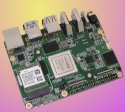Banana Pi previews RK3588 module and dev kit
Mar 3, 2022 — by Eric Brown 2,885 views Banana Pi previewed a “Core” module with an octa-core -A76 and -A55 Rockchip RK3588 with up to 8GB LPDDR4 and 128GB eMMC. A carrier board adds 2x GbE, 2x SATA, 3x HDMI, 4x USB, and PCIe Gen3 x4.
Banana Pi previewed a “Core” module with an octa-core -A76 and -A55 Rockchip RK3588 with up to 8GB LPDDR4 and 128GB eMMC. A carrier board adds 2x GbE, 2x SATA, 3x HDMI, 4x USB, and PCIe Gen3 x4.
Banana Pi has teased an upcoming compute module and carrier board based on Rockchip’s RK3588, which will also be appearing in Q2 2022 on Radxa’s Rock 5 Model B. The products are offered by the Banana Pi unit that will soon ship the RK3568-based, quad-GbE BPI-R2 Pro router board. The unnamed Core module and carrier have begun sampling, and the BSP for Linux and Android 12 is still under development.


Banana Pi RK3588 Core module alone (left) and plugged into carrier board
(click images to enlarge)
(In other recent news about Rockchip hacker boards, Shenzhen Xunlong has begun selling the recently announced, RK3399-based Orange Pi 4 LTS SBC. It is available on AliExpress for $62.90 with 3GB RAM and 16GB eMMC and $72.90 with 4GB RAM and 16GB eMMC. Amazon sales should launch soon.)
The 8nm-fabricated RK3588 has 4x up to 2.4GHz Cortex-A76 and 4x up to 1.8GHz -A55 cores configured using Arm’s DynamIQ. There is also a powerful Mali G610MC4 GPU and a 6-TOPS NPU (up from 3-TOPs on Rockchip’s RK3399Pro and RK1808). The SoC supports 8K, 10-bit video decode and 8K encode. The RK3588 delivers about 3x time faster performance than the RK3399 using Geekbench 4 CPU benchmarks and delivers even faster GPU performance.
— ADVERTISEMENT —
The SODIMM-style Core module will ship with 2GB to 8GB LPDDR4 and 32GB to 128GB eMMC. The 12V/1A module has a guaranteed operating range of 0 to 80℃ but has been tested to -20 to 85℃.
 Radxa Rock 5 |
The large carrier board appears to be more of a prototyping board rather than something you might deploy commercially. Unlike most Banana Pi boards or the Rock 5, there is no 40-pin GPIO header.
The carrier board has 2x GbE ports, compared to a single 2.5GbE port with PoE on the Rock 5 SBC. There are 3x HDMI ports with up to 8K support, at least one of which is probably an input port. Dual powered SATA ports and a PCIe Gen x4 edge connector provide expansion possibilities.
USB I/O is listed as “double TypeC/USB 3.1.” What we see is the same as what is listed in the Tom’s Hardware report that alerted us to the Banana Pi forum posting: single USB 3.1 host and USB Type-C ports and 2x USB 2.0 host ports.
The carrier board is further equipped with a microSD slot, audio and DC input jacks, and “ribbon connectors,” which are presumably for MIPI-CSI and/or MIPI-DSI. There also appears to be a wireless module and a coincell battery holder to assist an RTC.
Banana Pi describes itself as an “open source hardware project led by Guangdong Bipai Technology, and supported by Taiwan Hon Hai Technology (Foxconn).” We now see no mention of SinoVoip on the website although it is listed at the top of the forum announcement. We had previously listed SinoVoip as the owner of Banana Pi, and SinoVoip continues to list Banana Pi products as its own. For more on other Banana Pi boards, see our recent catalog of 136 open-spec Linux SBCs.
Further information
Banana Pi’s RK3588-based Core module and carrier board have begun sampling. No pricing or production availability information was provided. More information may be found in Banana Pi’s announcement.

Please comment here...